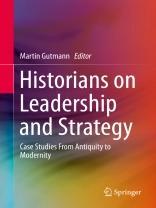This book examines the well-covered subject of leadership from a unique perspective: history’s vast catalogue of leadership successes and failures. Through a collection of highly compelling case studies spanning two millennia, it looks beyond the classic leadership parable of men in military or political crises and shows that successful leadership cannot be reduced to simplistic formulae.
Written by experts in the field and based on rigorous research, each case provides a rich and compelling account that is accessible to a wide audience, from students to managers. Rather than serving as a vehicle for advancing a particular theory of leadership, each case invites readers to reflect, debate and extract their own insights.
Tabela de Conteúdo
Introduction: The Value of the Historical Perspective for Leadership Studies.- Part I. The Postwar Period.- Leadership in War and Genocide.- Lost in Culture.- Prisoners as Leaders of Political Change.- Part II. The Second World War.- When Complexity Costs Lives.- Paul Geheeb and Nazi Germany.- Part III. The Age of the Industrial Revolution.- Mary van Kleeck and the Formation of the International Industrial Relations Institute.- Roald Amundsen in the Age of Polar Exploration.- Clash of Cannons.- Industrial Leadership and the Long-Lasting Competitiveness of the Swiss Watch Industry.- Part IV. The Pre-Modern Period.- Mary Tudor, the First Sovereign Queen of England.- Muhammad II Khwarazmshah Meets Chinggis Khan.- Töregene, Imperial Widow in the Mongol Empire in the 1240s.- Pericles of Athens.
Sobre o autor
Dr. Martin Gutmann is the Managing Director and Lecturer at the Swiss School of Public Governance, ETH Zurich, Switzerland.












